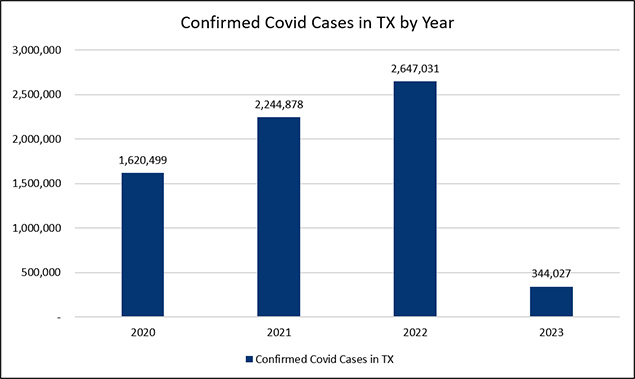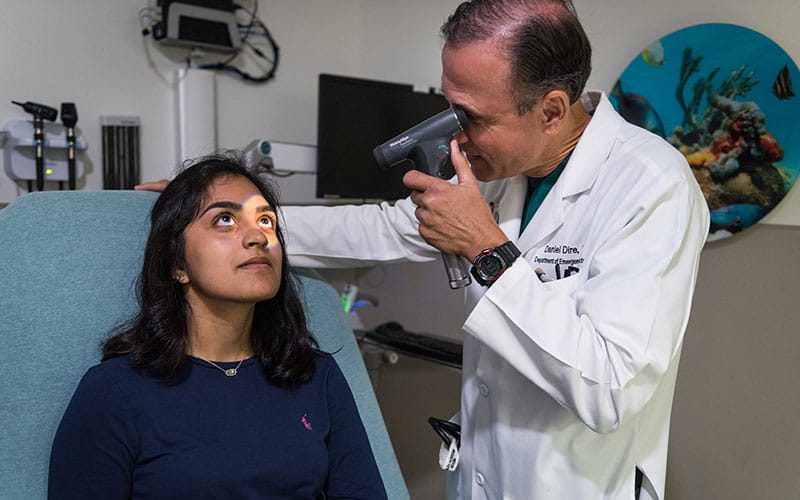Infectious Disease
Bacteria, viruses, fungi and parasites cause infectious diseases. They can be passed person to person, by insects or animals, or by contaminated food or water. Examples include:
- COVID-19
- HIV (human immunodeficiency virus)/AIDS
- Sexually transmitted infections (chlamydia, gonorrhea, syphilis, genital herpes)
- Meningitis
- Tuberculosis
- Influenza (flu)
Infectious diseases can spread easily from person to person. They can quickly affect an entire neighborhood, school or community.
One example is the COVID-19 pandemic. The new virus spread quickly, infected millions and killed many of our friends and neighbors. The impact it had on every aspect of our lives – work, school, commerce, interpersonal relationships and mental health – is clear.
Fortunately, most infectious diseases are preventable, treatable and manageable with proper hand hygiene, vaccinations, personal protective equipment, medications or other infection prevention methods.
Sexually Transmitted Infections
Sexually transmitted infections (STI) can have a significant impact on health, especially when they are left untreated. They can lead to:
- Certain cancers
- Increased risk for HIV
- Infertility
- Birth complications
According to the U.S. Department of Health and Human Services, rates of sexually transmitted infections were at an all-time high in 2021.
Risk Factors for STIs
The risk factors for infectious disease vary depending on the condition. If you’re sexually active, you are at risk of acquiring and spreading sexually transmitted diseases, especially if you don’t use a condom. Ask each new sexual partner if they have been tested for STIs recently, and what their status is.
Risk factors for STIs include:
- Having sex without a condom or dental dam
- Having many sexual partners
- Having a history of STIs
Infectious Disease in Bexar County
Getting tested for infectious diseases like COVID-19 and sexually transmitted infections is an important way to stop the spread.
HIV/AIDS
HIV (human immunodeficiency virus) can progress to AIDS if not managed properly. There is currently no cure for HIV or AIDS, but it can be clinically managed.
In 2020, 4,302 people were diagnosed with HIV in Texas. New cases of HIV are most common in the 25-34 age group. HIV rates are about half as high in the 15-24 and 35-44 age groups.
Syphilis
In 2018 in Bexar County there were 308 reported cases of syphilis. According to the San Antonio Metropolitan Health District, “Bexar County ranks 3rd for the most chlamydia, gonorrhea and primary and secondary syphilis cases in the state.”
In 2017 there were 17 cases of congenital syphilis in Bexar County. Congenital syphilis is when a mother infected with syphilis passes the infection to the baby. Congenital syphilis can cause birth defects, miscarriage, stillbirth and prematurity.
COVID-19
The COVID-19 pandemic hit Texas hard. According to the Texas Department of Health and Human Services, confirmed cases peaked in 2022 at 2.6 million.
The rate of reported and confirmed COVID-19 cases decreased dramatically in 2023 due to vaccines and at-home testing. Positive at-home tests are rarely reported to the Texas Department of Health and Human Services.
University Health Resources
University Health Clinics
Find primary care and specialty services (including prenatal and maternity care) at University Health in San Antonio.
Texas Wears Condoms
Texas Wears Condoms distributes condoms to individuals in Texas free of charge via online ordering. Texas Wears Condoms also provided free HIV test kits for those who qualified. Texas Wears Condoms improved knowledge, destigmatized condom use and reduced the spread of HIV and sexually transmitted infections in Texas.
FFACTS Clinic
The Family-Focused AIDS Clinical Treatment Services (FFACTS) Clinic at University Health cares for people with HIV/AIDS in San Antonio. It provides primary care, psychiatric services, specialty pharmacy services and women’s health care.
#FAM210
#FAM210 offers peer support for people with HIV and monthly support group meetings with guest speakers, educational activities and resources. It assists clients with finding housing, utilities, HIV care, employment and more.
Ryan White grant at University Health
The Ryan White program provides care for people living in the San Antonio transitional grant area with HIV/AIDS who are low-income, uninsured and underserved to improve their health outcomes.
SMASH (Substance Misuse Awareness and Sexual Health)
SMASH provides evidence-based substance misuse education combined with HIV and hepatitis programming to reduce infections. The services are provided to racial/ethnic minority males at risk for HIV/AIDS with an emphasis on individuals who are not in stable housing and reside in communities with high rates of HIV.
PL4Y (Positive Links for Youth and Emerging Adults)
People aged 18-29 years living with HIV are the least likely to engage in HIV care or achieve virus suppression. The primary purpose of is to adapt an existing mobile health intervention to the specific needs of people in this age group living with HIV in South Texas.
Resources in Bexar County
Alamo Area Resource Center
The Alamo Area Resource Center provides health care and social services to people in the LGBTQIA+ community who are living with HIV/AIDS.
BEAT AIDS
B.E.A.T. stands for “Black Effort Against the Threat of AIDS.” BEAT AIDS connects people with HIV/AIDS to health care, support groups, mental health services and health education.
MetroHealth Mobile Clinic
The San Antonio Metropolitan Health District funds a mobile unit with the ability to provide testing and treatment for sexually transmitted diseases.
San Antonio AIDS Foundation
The San Antonio AIDS Foundation aims to reduce new HIV and other sexually transmitted infections by providing equitable access to education, prevention and other sexual health care and improving the health and quality of life of people living with HIV or AIDS.

Symptoms of Measles
View the infographic in English [PDF].
View the infographic in Spanish [PDF].
How Contagious is Measles



